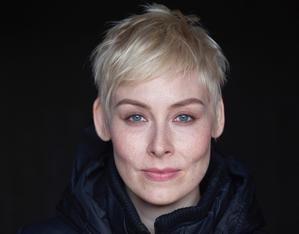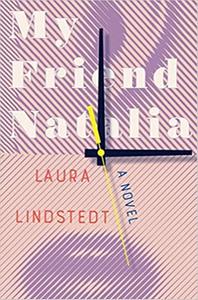
|
|
| photo: Heini Lehväslaiho | |
Finnish author Laura Lindstedt's first novel, Sakset (Scissors), was published in 2007 and nominated for the Finlandia Prize, the most prestigious book award for fiction in Finland. Her second novel, Oneiron (2015), earned the Finlandia Prize. My Friend Natalia, Lindstedt's third novel, is an erotic story of an ambitious therapist's sessions with an unforgettable patient, translated by David Hackston and just published by Liveright.
On your nightstand now:
My bed is always surrounded by books. Some of them I have already read, some of them I will truly read, some of them are doomed to be left unfinished, and some of them are just there, keeping me company: Chris Kraus's I Love Dick, a collection of Kafka's short stories, Samuel Beckett's The Unnamable (L'Innommable), Oulipo Compendium, Gertrude Stein's The World Is Round, Lucia Berlin's A Manual for Cleaning Women, Kate Elizabeth Russell's My Dark Vanessa--just to pick some examples.
Favorite book when you were a child:
Eric Carle's The Very Hungry Caterpillar. This little omnivorous larva eating its way through the pages fascinated me immensely. The book itself embodies bookwormishness. It is an allegory for a voracious readership. The Hungry Caterpillar showed me from the very beginning that a book as an object of art doesn't have to be sterile and intact. It can carry with it whatever you can imagine: holes, ruptures, traces of passion.
Your top five authors:
Maggie Nelson, Thomas Bernhard, José Saramago, Marguerite Duras, Imre Kertész.
Book you've faked reading:
I try not to fake actively that I've read something I haven't. Nevertheless, I have certainly referred to some books so knowingly that misunderstandings might have occurred. For instance, to Infinite Jest by David Foster Wallace.
 Book you're an evangelist for:
Book you're an evangelist for:
At the moment it is Maggie Nelson's The Red Parts. I just love her intellectual, unyielding and honest writer's voice! "I became a poet in part because I didn't want to tell stories," she writes. "As far as I could tell, stories may enable us to live, but they also trap us, bring us spectacular pain." The format of a story leads us to believe that there is a closure, a final conclusion. But this is a dangerous illusion. I believe one of the main tasks of today's literature is to battle against these tempting but false closures. In this endeavor, writers like Maggie Nelson make good company.
Book you've bought for the cover:
It was a photo of Nina Hagen tied up with a rope against a chair that made me buy the art book of Pierre et Gilles published for the Turku Art Museum exhibition. This eye-striking picture was originally created for the cover sleeve of Hagen's album Revolution Ballroom.
Book you hid from your parents:
I snuck the illustrated book titled Sexorgies in Pictures Through the Ages from my parents' bookcase. They didn't try to hide it from me, maybe they didn't even remember they had it. It was me who browsed through it from time to time in total secrecy.
Book that changed your life:
There's no question about it. French author Nathalie Sarraute's The Golden Fruits (translated by Maria Jolas) changed my life's direction. I wrote my proseminar research paper on this novel in the late '90s--oh, how little I knew then! I continued working with her oeuvre, and, well, this year my Ph.D. thesis on Sarraute will come of age.
Favorite line from a book:
"Life is not a series of gig lamps symmetrically arranged; life is a luminous halo, a semi-transparent envelope surrounding us from the beginning of consciousness to the end." --from Virginia Woolf's essay "Modern Fiction."
Five books you'll never part with:
Herman Melville's Bartleby, Marguerite Duras's The Vice-Consul (translated by Eileen Ellenborgener), Marja-Liisa Vartio's The Parson's Widow (translated by Aili Flint), Herta Müller's Nadirs (translated by Sieglinde Lug), Svetlana Alexievich's Chernobyl Prayer: A Chronicle of the Future (translated by Anna Gunin).
Book you most want to read again for the first time:
If I had a time machine, I would love to read Lucy Maud Montgomery's Emily of New Moon (1923) with new eyes. I might never again reach that kind of innocent identification in my life as a reader.
The book you would have loved to write:
The debut novel HHhH (translated by Sam Taylor) by French author Laurent Binet. This brilliant book is about the assassination of Reinhard Heydrich, who was a Nazi leader in Prague during World War II. As a narrator, Binet is painfully aware of the amount of fictionality in the history-oriented writing. This awareness grabs hold of the reader from the very first page till the end of the novel. Despite the abundance of self-reflexivity, HHhH is a thoroughly captivating novel. I felt both sorry it had to end and envious of not having written it.

